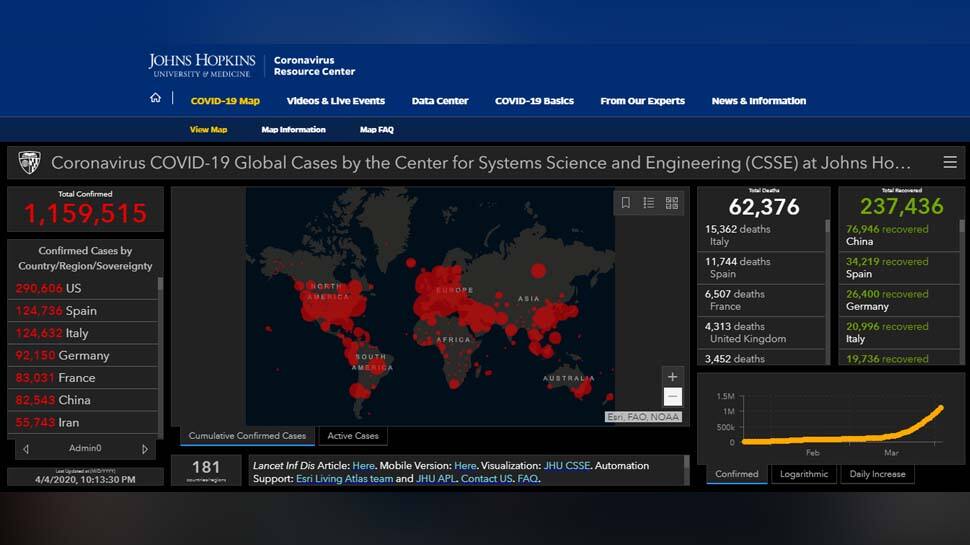Coronavirus COVID-19 death toll rises to 63,832 globally, positive cases over 11.5 lakh
The US remained at the top with the maximum number of positive cases at 290,606, followed by Spain with 124,736 infected cases.
Trending Photos
)
As another day of lockdown due to the coronavirus COVID-19 pandemic came to an end, the total number of positive cases across 181 nations on Saturday (April 4) stood at 1,159,515 and death toll reached 63,832, according to the data released Johns Hopkins University`s Coronavirus Resource Centre.
The US remained at the top with the maximum number of positive cases at 290,606, followed by Spain with 124,736 infected cases, Italy with 124,632 cases, Germany with 92,150 cases and France at the fifth spot with 83,031 cases. On Saturday, Spain surpassed Italy on the number of positive cases.

The highest death toll so far has been recorded in Italy with 15,362 deaths, followed by Spain with 11,744 deaths, the US with 7,826 deaths, France with 6,521 deaths and the UK with 4,320 deaths. All these countries have surpassed China, the epicentre of the virus, in terms of the death toll.
Italians have seen the world around them turn unrecognisable from the various lockdowns and social distancing measures used to fight the new coronavirus outbreak. Italy on Saturday saw its first drop in patients receiving intensive care for the coronavirus. "This is very important news," civil protection service chief Angelo Borrelli told reporters of the drop from 4,068 to 3,994 intensive care patients over the past 24 hours. "It allows our hospitals to breathe."
The Varese hospital has received six new robots that gently check the pulses of highly infectious patients on life support. The doctors and nurses love them because they also help save their own lives. Some are white and have screens and various sensors in place of a human head. Others are simpler and look a little like a black broomstick on wheels.
The doctors say the robots bring smiles from younger patients. But their real purpose is to help save doctors from both catching and spreading the disease. "Robots are tireless assistants that can't get infected, that can't get sick," said the Circolo Hospital's intensive care unit director Francesco Dentali. "Doctors and nurses have been hit hard by this virus. The fact that robots can't get infected is a great achievement." The readings from the machines allow medics to stay out of the intensive care units and monitor patients' vital signs on computer screens in separate rooms.
The toll of 809 people who died during the past 24 hours was below 932 deaths on April 3 and also down from a daily record of 950 on April 2, the Health Ministry said. Spanish Prime Minister Pedro Sanchez has said he would ask parliament to extend lockdown measures by 15 days until April 26, as the rate of new coronavirus infections and deaths slowed again in one of the world`s worst-hit countries. In a televised address to the nation, Sanchez said the current lockdown was beginning to show results, but he warned that Saturday`s extension of the country`s state of emergency would not be the last.
"We are at the start of the decrease in the epidemic. We are stronger than we think but we have to endure. With sacrifice, resistance and the spirit of victory," he said, adding that some economic restrictions would be lifted after Easter. "We are not going to extend the standstill of economic activity," he said. Shops, bars and restaurants will, however, remain closed.
Sanchez also reiterated his support for the launch of jointly issued debt by eurozone members as a way to counter the coronavirus economic impact, an idea championed by Spain and Italy but rejected by Germany and other northern EU members. "Nobody should be mistaken, the Spanish government is going to work for and defend and will never renounce Eurobonds because this is solidarity, this is Europe. The determination of the government is total and absolute," he said.
The pandemic could cost the global economy $4.1 trillion, equivalent to 4.8 per cent of worldwide output, as it ravages major economies, the Asian Development Bank warns. In the US, employment plunged by 701,000 in March and the jobless rate surged to 4.4 per cent, the US Labor Department reported. The pandemic threatens to cause food shortages for hundreds of millions of people, especially in Africa, who depend on imports of foodstuffs paid for by exports, said the World Food Programme.
More than 3.9 billion people -- half of the world's population -- have been called on or obliged by their authorities to stay at home in more than 90 countries or territories. Anthony Fauci, head of infectious diseases at the National Institutes of Health and aide to US President Donald Trump, says the virus might spread through the air via normal breathing and speaking, "as opposed to coughing and sneezing." Trump's administration suggests widespread use of simple masks or scarves to help deter the spread of the virus, though the US leader says he will not be following this advice himself.
Many countries have restricted travel from the most affected areas and implemented lockdowns as the World Health Organization (WHO) declared the outbreak a global pandemic with Europe being its new epicentre.
Stay informed on all the latest news, real-time breaking news updates, and follow all the important headlines in india news and world News on Zee News.
Live Tv







)
)
)
)
)
)
)
)
)
)
